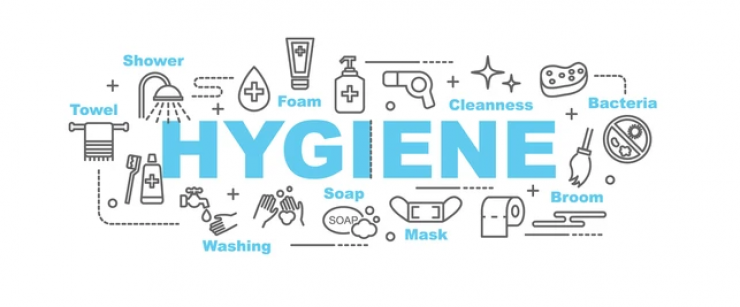
Hygiene is a series of practices performed to maintain health and prevent the spread of diseases.
Many people equate hygiene with 'cleanliness’, but hygiene is a broad term. It includes such personal habit choices as how frequently to take a shower or bath, wash hands, trim fingernails, and wash clothes. It also includes attention to keeping surfaces in the home and workplace clean, including bathroom facilities. Some regular hygiene practices may be considered good habits by the society, while the neglect of hygiene can be considered disgusting, disrespectful, or threatening.
Hygiene is essential for protecting vulnerable populations such as the elderly from infections, preventing the spread of antibiotic resistance, and for combating emerging infectious diseases such as SARS and Ebola.
In medicine, the hygiene hypothesis states that early childhood exposure to particular microorganisms (such as the Gut microbiota and Parasitic worms) protects against allergic diseases by contributing to the development of the immune system. In particular, a lack of exposure is thought to lead to defects in the establishment of immune tolerance. The time period for exposure begins in the uterus and ends at school age.
Reducing personal hygiene, such as not washing hands before eating, is expected to simply increase the risk of infection without having any impact on allergies or immune disorders.
Humans and the microbes they harbor have co-evolved for thousands of centuries; however, it is thought that the human species has gone through numerous phases in history characterized by different pathogen exposures.
I think fundamental changes in modern lifestyle have led to decreased exposure to certain microbial or other species.
Since allergies and other chronic inflammatory diseases are largely diseases of the last 100 years or so, the "hygiene revolution" of the last 200 years came under scrutiny as a possible cause. During the 1800s, radical improvements to sanitation and water quality occurred in Europe and North America. The introduction of toilets and sewer systems and the cleanup of city streets, and cleaner food were part of this program. This in turn led to a rapid decline in infectious diseases, particularly during the period 1900-1950, through reduced exposure to infectious agents.
The recent pandemic has clearly shown that more people were infected in Rich countries than in Poor countries. Clean and Hygienic cities were more infected than dirty and unhygienic slums.
This shows that Hygiene is very good, but Too Much Hygiene is Bad


Login To Leave a Comment